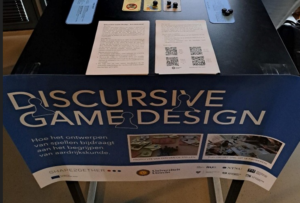
The article at hand explores the concept of playful scholarship, focusing specifically on the use of playfulness in re-assessing the collaboration between academia and societal partners to tackle “intractable policy controversies” (Schön and Rein 1994, p. 23)—i.e., challenges in which opposing parties operate with conflicting frames (often without even noticing). After arguing that earlier attempts at using games in academia often only evoke the rhetoric rather than the spirit of play (Sicart 2014) and thereby may limit spaces for actually playful scholarship, the authors emphasize how the heuristic of playful game design (rather than game play) can help address this issue.
The article can be found [HERE], and was published in Eludamos: Journal for Computer Game Culture, Vol.12, No.1 in September of 2021
The core of the article discusses the place that games can play in facilitating and supporting difficult discussions in professional and educational settings. In it, Stefan Werning and Jasper van Vught examine the ways in which play can be applied to complex conversations on a systemic level. They explore this by referencing a research project about drug policies in the Netherlands, in which concerns of (among others) law enforcement, policy-makers and healthcare workers are characteristically entangled. Through this examination, their aim was to propose techniques for how playfulness can enrich relations between academics and public partners from a more long-term perspective.




